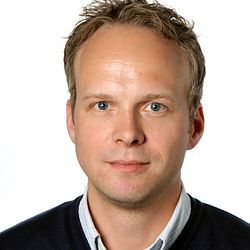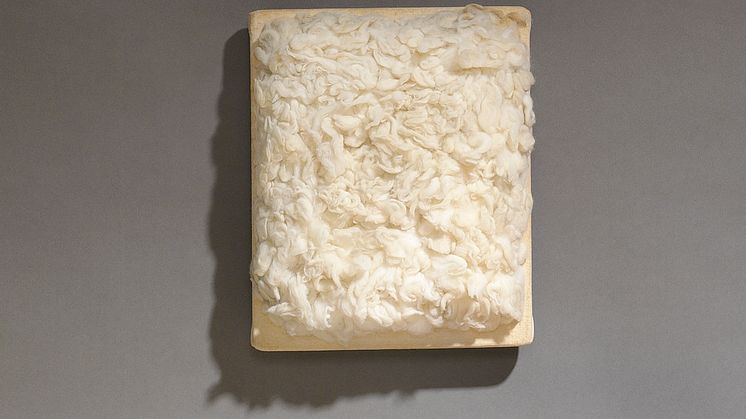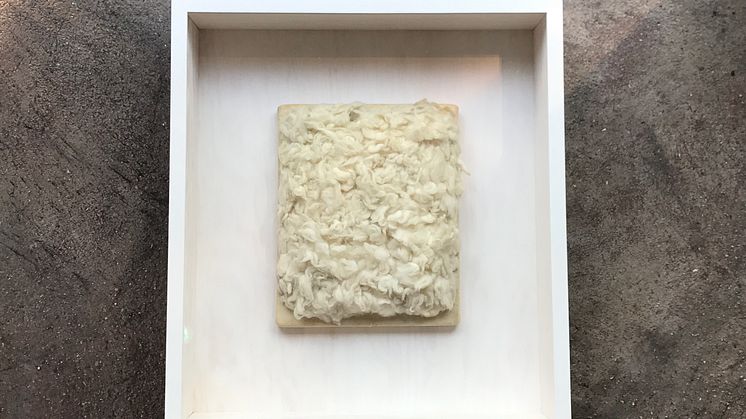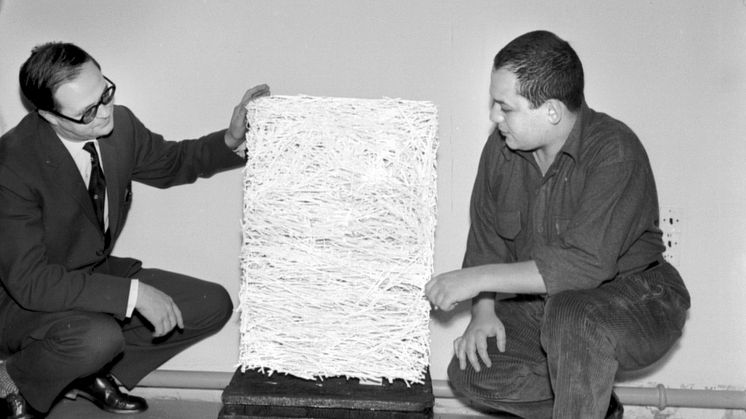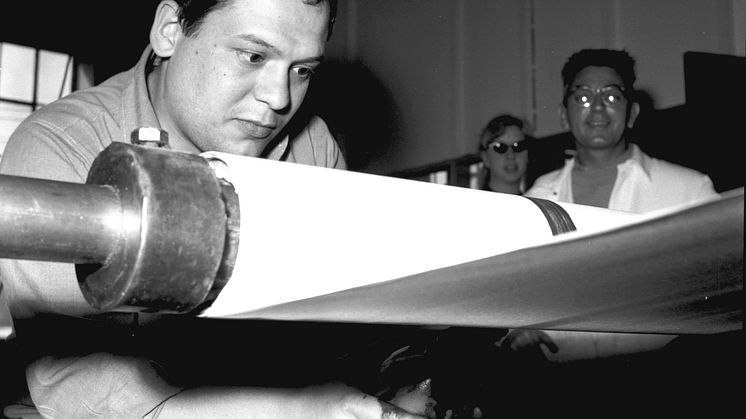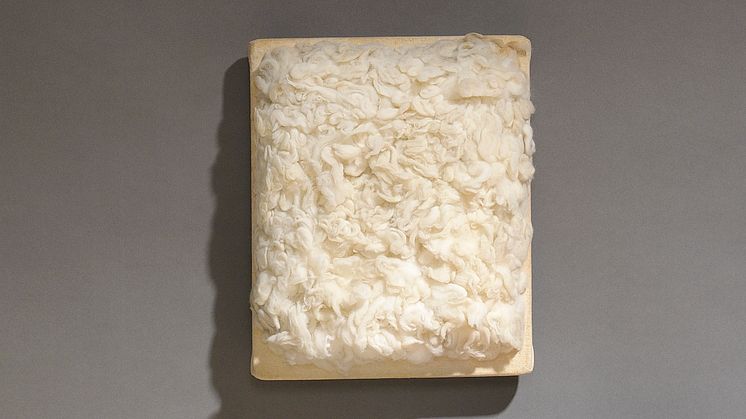
Press release -
Piero Manzoni up for Auction in Denmark
An extremely rare "Achrome" piece by Piero Manzoni from 1961 will be exhibited in London from 5-8 November and will be up for auction at Bruun Rasmussen in Copenhagen on 5 December 2017. The work was made during the artist's stay in Denmark and has not previously been for sale.
"There is a well-documented story behind Piero Manzoni’s piece that is up for auction. He made several remarkable works while in Denmark during 1960-61. The special relationship with the shirt manufacturer Aage Damgaard in Herning was of great importance to the artist's work in the years just before his premature death in 1963, where Damgaard gave Manzoni total autonomy to unfold his great artistic talent," says Niels Raben, Head of the department of modern art.
The Italian artist Piero Manzoni (1933-63) was and is one of the most prominent exponents of the conceptual art of the 1960s, where the idea is the focal point rather than the method. He created artwork made of materials such as cotton wool and straw, placed his fingerprints on eggs, packaged his breath and canned his own faeces. It is the provocative and ground-breaking works of art that have made Piero Manzoni a famous and notorious name worldwide. What fewer people probably know today is that the city of Herning and a local shirt factory played an important role in the artist's production.
In several of his works, the material became the supporting element, just like the idea or concept itself. Piero Manzoni wanted to create art that was neutral and could not provide associations to anything but instead express a total sense of emptiness. The result was a number of Achromes, which are colourless images created by for instance natural fibres, which is the case with the piece up for auction.
Artist-in-residence at the Shirt Factory in Herning
The Danish art museum HEART in Herning currently owns the world's largest public collection of Piero Manzoni works. This is due to the foresight and artistic interest of the local shirt manufacturer, Aage Damgaard (1917-1991). Aage Damgaard invited Piero Manzoni twice to his factory in Herning (1960-61). It was during these stays that Manzoni created some of his most remarkable works, including the offered work "Achrome" (1961), which is estimated at DKK 1.5-2 million (€ 200,000-270,000).
With Manzoni's stay in Herning and Copenhagen in 1960-61, one of the 1960s’ most important and most radical avant-garde artists in the world became part of Danish art history. At the same time Herning and Copenhagen was given a prominent place in Piero Manzoni's personal biography as a place of origin and setting for some of his most iconic works, happenings and showdown with firmly-defined, historical definitions of the essence of art. A showdown – or a dialectic – which, on the one hand is canonized history, on the other hand continues to raise so fundamental questions about the nature of art and aesthetics that Piero Manzoni's oeuvre will probably always be considered a vibrant and ground-breaking contribution to the debate.
Manzoni's Connections to Denmark
Piero Manzoni's relationship with Denmark is primarily due to three people: Firstly, the gallerist named Arthur (Addi) Köpcke who ran Galerie Köpcke in Copenhagen in the period between 1958 and 1963, and exhibited works by Piero Manzoni in June-July of 1960 and October of 1961. Secondly, Aage Damgaard, who from the 1950s in a highly progressive way integrated art and artists into his company. And thirdly, the artist Paul Gadegaard, who was permanently employed by Aage Damgaard to completely decorate the Angli factory in Herning and came to establish the contact between the young avant-garde artist from Italy and the visionary patron of the arts from Jutland.
Manzoni’s Exhibitions and Production in Denmark
Piero Manzoni exhibited at Galerie Köpcke in Copenhagen in June 1960, showing inflatable sculptures ("Corpi d'Aria"), white monochromatic paintings ("Achrome"), sealed lines in containers ("Linea") and eggs with the artist's fingerprints ("Uova Sculptura"). In a letter at the time, he reflected on his experiences and surprising new connection to Herning: "(...) In Copenhagen I enjoyed a success that astonished me. The gallery was full, there were articles in all the papers spread over 3-4 columns from the top of the page to the bottom, etc. Incredibly I was hired by a shirt factory (room and board, plus Lit. 11,000 a day and an assistant with a car) for a month, with all the technicians of the factory at my service, so that I could pursue all the technical/artistic research that I liked (...) "(Celant, p. 652).
After the exhibition at Galerie Köpcke, he went to Herning, where he spent the month of July creating his subsequently famous 7,200-meter-long line ("Linea") and in general experimented with all the materials that the textile factory could offer him – materials including synthetic and natural fibres. After another exhibition at Köpcke in Copenhagen in October 1961, where the famous cans of faeces ("Merda d'Artista") among other works of art were presented to a Danish audience, Manzoni returned to Herning: "(...) This period resulted in the 'hairy canvases', as Manzoni called the 'Achromes' that had natural and synthetic fibres attached to the material, such as nylon, the lord and master of textile production in these years"(Celant, p. 655).
Provenance and Documentation
The owner of the offered "Achrome" was a gallery assistant in Copenhagen in the early 1960s and acquired the piece through his employer at Galerie Köpcke in 1962. In 1989, the work was presented to Dr Freddy Battino from Galleria Blu in Milan in connection with the preparation of the catalogue raisonné in which it is included (Battino / Palazzoli no. 685 + Celant no. 901). The piece has, to the best of our knowledge, not been displayed or offered up for auction on any other occasion.
Germano Celant: "Piero Manzoni - Catalogo Generale", Skira Editore, Milano 2004.
Freddy Battino & Luca Palazzoli: "Piero Manzoni - Catalog raisonné", Vanni Scheiwiller, Milano 1991.
Manzoni on Display in London and Copenhagen
This autumn, Piero Manzoni’s "Achrome" (1961) will be on display at our exhibition in London at the Shapero Modern gallery on 32 St. George Street from 5-8 November.
The work will be up for sale at Bruun Rasmussen's international auction in Bredgade 33, Copenhagen. The Preview is open from 23-27 November, and the auction will be held on 5 December.
View Piero Manzoni's "Achrome" (1961)
.
Topics
Bruun Rasmussen Auctioneers is one of Scandinavia’s leading international auction houses, and one of Denmark’s oldest. It all started on 6 October 1948, when Arne Bruun Rasmussen conducted the first traditional auction in the saleroom at Bredgade 33 in Copenhagen. Today, Jesper Bruun Rasmussen stands at the helm of the family-run business together with the third generation of the family, his son Frederik and daughter Alexa, and the company’s CEO Jakob Dupont.
In 2004, the first online auction was launched, and today the auction house has expanded to include departments in Copenhagen and Aarhus and representations in Sweden, Germany, France, Belgium, Luxemburg, Spain, Italy, Thailand and the US. About 100,000 lots are put up for auction each year at the traditional auctions and daily online auctions. Here you can bid on everything from art, antiques, modern design and jewellery to books, coins, stamps, wine and weaponry.

